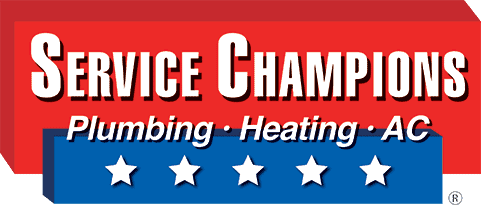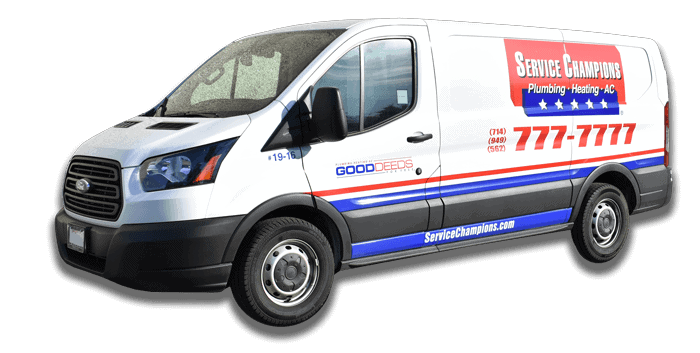Common Misconceptions About Air Conditioning Servicing Debunked
Air conditioners are a big part of our home’s comfort throughout the summer – and sometimes throughout the year. Air conditioning maintenance is one of the most important parts of keeping your system running as it should, but it can be difficult to separate the fact from the myth when it comes to air conditioning servicing.
After decades in the business, our team at Service Champions knows that it can be easy to let air conditioner maintenance go until it’s too late – especially if you’re not sure what you need to keep your system running efficiently. We’re here to bust the common myths and misconceptions about air conditioning service so you can prepare your AC for a long summer.
Myth 1: Air Conditioning Consumes a Lot of Energy
One of the biggest myths is that air conditioners consume a lot of energy and cost you in energy bills. While an inefficient AC can drive up your energy costs, a properly serviced AC can keep you cool and comfortable without breaking the bank.
Here are some tips to conserve energy with your AC:
- Upgrade your AC: If your system is older, it may not be as efficient as it could be. Newer systems are designed to be more energy efficient than earlier systems, requiring less energy without compromising cooling.
- Install a smart thermostat: If you’re running your AC all day and night, you’re wasting a lot of energy and adding unnecessary wear and tear to your system. Smart thermostats can go a long way toward preventing excess energy use by optimizing your AC’s schedule. For example, you can program your thermostat to turn off your AC when you’re away at work and start cooling just before you arrive at home.
- Insulation: If your insulation is worn or damaged, you can lose a lot of cooled air. Your home won’t be as comfortable, your energy bills will rise, and your AC will have more wear and tear as it struggles to cool your home. If you’re struggling with your AC’s efficiency or repairs, fix your insulation before you make any decisions about upgrading.
Myth 2: Your Filter Only Needs to Be Changed Once a Year
Air filters aren’t universal across AC systems. The lifespan of your filter depends on several factors, including the thickness and efficiency of the filter, how often you use your HVAC system, the air quality in your home, and more.

Your individual needs also factor into how often your filter should be changed. For example, people with allergies or pets and those who smoke should change their filters more often.
While some filters may need to be changed more or less frequently, no filter should go a whole year without a change. Over time, air filters become dirty and clogged from the dust, dirt, and pet dander they collect and prevent from entering your system. When this happens, your system has to work much harder than it should to cool your home.
Make checking the air filter at least once a month part of your household routine. If it’s dirty, clean or replace it – depending on the type of air filter you have. This is a simple maintenance step that can make a huge difference in your home’s air quality and your system’s efficiency.
Myth 3: Get a Bigger AC for Better Cooling
This is an enduring myth that results in a lot of high energy bills, upfront expenses, and poor cooling for homeowners. Some things are better if they’re bigger, but that doesn’t apply to AC systems. Your home’s AC should always be proportionate to your home for optimal cooling – not smaller or bigger.

If your AC system is too big for the space, it will cycle on and off to avoid overcooling your home. More energy will be used because of the constant starting and stopping, yet your home may not be as cool as it could be. In addition, ACs that are too big often leave your home humid.
Conversely, an AC that’s too small will struggle to cool your space. You may need to keep the thermostat at the lowest setting, even when the temperature outside is comfortable cold, to meet your cooling demands. You’ll also have much higher energy bills and more frequent repairs because your system is taxed.
Myth 4: Your AC Should Be Set to the Lowest Temperature
An AC unit works by turning on or off as needed to reach the temperature you set on the thermostat. Many people mistakenly believe that setting the thermostat to the lowest possible setting will provide the best cooling but keeping the temperature extremely low – especially on extremely hot days – will cause your AC to run for much longer than necessary.
Ideally, your thermostat temperature should be no lower than 20 degrees Fahrenheit below the ambient room temperature. AC units are not designed to keep your home chilly, but they can create a comfortable temperature and humidity drop that keeps you comfortable.
Myth 5: Close Off Rooms to Reduce Energy Usage
Some people recommend closing off vacant rooms to keep your living areas cooler. While that may be effective if you have window or portable AC units, it’s not a good practice if you have an AC system that’s designed to cool your whole home.

When you have a whole-home AC system, blocking off vacant rooms can cause problems for your unit. Your system may work harder to maintain the temperature you set, leading to stress and potential breakdowns.
Myth 6: AC Units Should Be Replaced Every 10 Years
AC systems have a lifespan of 10 to 15 years with proper care, but they can vary by many factors. How well you maintain your unit, the quality of the unit itself, the local climate and temperature averages, and other factors can determine how long your AC will last.
Some units may need to be replaced after 10 years, while others may last 20. Others may have critical problems that force you to replace them before you even reach 10 years. The best way to ensure you have a long-lasting system is with regular AC maintenance and prompt repairs from a qualified HVAC technician.
Myth 7: DIY Repairs Are the Best Choice
There are some AC maintenance tasks that you can do yourself, such as changing the air filter, but you should leave repairs to the professionals. AC systems have complex components, including electrical components, that require knowledge, training, and specialized equipment to repair. Attempting these repairs on your own or relying on a “handy” friend or family member can do more harm than good. In fact, you may end up spending more in the long run.
Here are some dangers of DIY AC repairs:
- Safety risks: DIY AC repairs can be dangerous. Professional AC technicians have extensive training, experience, and supervision to avoid many of the potential risks of HVAC systems. If you attempt to fix your air conditioner on your own, you could be at risk of injury, carbon monoxide leaks, electrical fires, damaged gas lines, and more.
- AC damage: A DIY fix may be tempting if your AC breaks down in the middle of the summer heat and you just want to get it running again, but that could create bigger and more stressful problems in the future. Worse yet, you could end up with a full system failure and a need to replace your AC in a rush during the busy season.
- Voiding the warranty: Warranties are great for peace of mind with an expensive system like an AC, but there are requirements you have to follow. Most manufacturers have a stipulation for the warranty that says only certified professionals should install, maintain, and repair their ACs. If you try to do the work yourself, you may void the warranty – leaving you footing the bill for the repair or replacement that would’ve otherwise been covered.
Myth 8: AC Maintenance Is an Unnecessary Expense
Many homeowners view AC maintenance as an added expense that offers little value. The truth is actually the opposite – the small expense of routine maintenance can pay off in preventing expensive repairs in the future, extends the life of your system, and saves on energy bills.
Here are some benefits of routine AC maintenance:
- Fewer repairs: Regular maintenance can reduce the need for expensive repairs. You’ll have a professional AC technician inspecting your system for minor problems before they become major repairs. They’ll also replace any worn-out components and replace them before a breakdown happens.
- Longer lifespan: If you neglect your system, you can end up with dust and dirt accumulated inside the system that can damage components and lead to premature breakdown. Routine maintenance keeps your system clean, lubricated, and in good condition, significantly extending its lifespan.
- Improved energy efficiency: Without AC servicing, your system must work much harder to maintain a comfortable indoor temperature, increasing energy consumption and monthly energy bills. Routine AC maintenance will keep your AC unit functioning efficiently to reduce energy costs.
- Enhanced safety: AC systems are generally safe, but there is a risk of fire or other hazards. This risk can be increased if you don’t have regular maintenance. Routine maintenance includes an inspection of your system and its components, including taking care of water damage, replacing faulty electrical connections, and checking for carbon monoxide leaks.
Schedule AC Maintenance from Service Champions

Don’t fall for these common AC myths. Take advice from the pros and keep your system running its best with AC maintenance from Service Champions. Contact us today to schedule your appointment!

